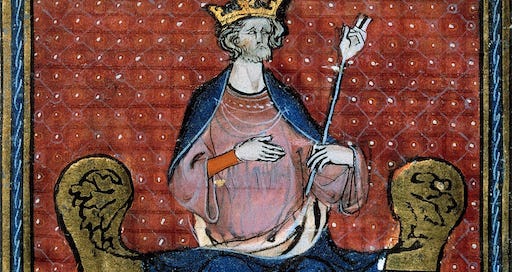This week in history: July 1-7
Foreign Exchanges is on a summer break. I’m taking care of some things around HQ and maybe even going on a little road trip. There will be no updates, AMAs, or other essays until I return on July 15. In the meantime, just so you don’t forget about me, I’m be sending out “this week in history” summaries each Sunday. Thanks, enjoy, and I’ll see you soon!
July 1, 1097: The Crusaders defeat a Seljuk army at Dorylaeum. The outnumbered Seljuks caught the vanguard of the Crusader army by surprise but were eventually worn down as the day went on and more Crusader forces kept arriving as reinforcements. The victory cleared the Crusaders’ path to Antioch.
July 1, 1968: The Non-Proliferation Treaty is signed by 62 countries. Nowadays it’s signed by 190 countries and has prevented the spread of nuclear weapons except for all the times it hasn’t done that.
July 1, 1997: Sovereignty over Hong Kong passes to China after 156 years of British colonial rule.
July 2, 1853: A Russian army crosses the Pruth River and occupies Moldavia and Wallachia, both nominally still Ottoman territories. In part this advance precipitated the Crimean War.
July 3, 987: Hugh of Capet is elected and crowned King of the Franks, establishing the Capetian Dynasty that would rule France (later through its cadet branches Valois and Bourbon) until the French Revolution, and then resume power after Napoleon until finally being removed for good in the Revolution of 1848.

Hugh of Capet’s coronation, a 13th-14th century miniature (Wikimedia Commons)
July 3, 1863: The Union Army of the Potomac defeats the Confederate Army of Northern Virginia at the Battle of Gettysburg. Their defeat ended a brief Confederate invasion of the north and, combined with the Union victory at Vicksburg a day later, is often considered the turning point of the American Civil War.
July 3, 1866: The Battle of Königgrätz, the key engagement in the Austro-Prussian War, ends with a decisive Prussian victory. The war ended a few weeks later and established Prussia as the dominant German state. This paved the way for German unification under Prussian control.
July 3, 2013: A military coup overthrows the Egyptian government of Mohamed Morsi, ending a brief experiment in democracy and returning Egypt to military rule.
July 4, 1187: The Battle of Hattin
July 4, 1456: The Ottomans lay siege to Belgrade, which at the time belonged to the Kingdom of Hungary. We’ll go into more detail on this one on the anniversary of the end of the siege later this month.
July 4, 1776: The Declaration of Independence is published in Britain’s North American colonies. Independence Day in the United States.
July 4, 1863: Confederate forces surrender the city of Vicksburg, Mississippi, to Union forces commanded by Ulysses S. Grant. The victory gave the Union control over the Mississippi River and, combined with the Union victory at Gettysburg the day before, was arguably the turning point in the American Civil War.
July 5, 1811: Venezuelan Independence Day
July 5, 1962: Algeria declares its official independence from France. Independence Day in Algeria.
July 5, 1977: Pakistan’s civilian government, under Prime Minister Zulfikar Ali Bhutto, is overthrown in a military coup led by General Zia-ul-Haq. Zia ruled Pakistan as president/dictator until he died in 1988.
July 6, 640: The Battle of Heliopolis
July 6, 1809: Napoleon defeats the Austrian army at the Battle of Wagram, near Vienna. The outcome forced the Austrians to sign an armistice and effectively broke up the Fifth Coalition. It ended fighting in central and eastern Europe until Napoleon’s invasion of Russia.
July 6, 1917: The Battle of Aqaba
July 6, 1967: The Nigerian Civil War begins when Nigerian forces invade the breakaway region of Biafra. The conflict eventually settled into a Nigerian blockade of Biafra, precipitating a massive humanitarian crisis in which hundreds of thousands of people (high estimates run to around 3 million) died of preventable causes, mostly starvation.
July 7, 1124: Crusaders capture Tyre. The city became one of the most important in the Kingdom of Jerusalem until it was captured by the Mamluks in 1291.
July 7, 1937: The Marco Polo Bridge Incident, a clash between Chinese and Japanese troops near Wanping, ends with the Chinese force holding the bridge but still forced to make concessions to the superior Japanese force in order to end the confrontation. This relatively minor incident sparked the Second Sino-Japanese War.
July 7, 1991: The Brioni Agreement ends the Slovenian War of Independence. Technically the agreement obligated Slovenia and Croatia to delay their independence bids for three months in exchange for the withdrawal of the Yugoslavian army from both republics, but in reality it ended the Slovenian part of the conflict while having no effect at all on the war in Croatia.
July 7, 2005: Terrorists explode four bombs on London public transit vehicles (three on the Underground and one on a bus), killing 56 people (including the bombers) in what’s become known as the “7/7” attacks. It’s generally believed that the four bombers were homegrown but in some way affiliated with or inspired by al-Qaeda, which claimed credit for the attacks.



